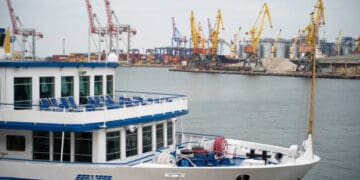The Japanese shipping company Nippon Yusen announced a temporary suspension of its sailings through the Red Sea following threats from Yemen’s Houthi movement to intensify attacks on shipping vessels in the area. This development comes as the Houthi group, aligned with Iran, has indicated it will broaden its target range to include U.S. ships, retaliating against American and British military actions in Yemen. The escalation of hostilities in the region has raised concerns among international companies and governments, marking a significant uptick in tensions amidst the ongoing conflict between Israel and Hamas militants in Gaza, which has now exceeded three months.
The Houthis have declared their actions as support for the Palestinian cause, disrupting not only regional peace but also posing challenges to global supply chains and economic stability, potentially influencing global inflation rates. Nasruldeen Amer, a spokesperson for the Houthis, stated in an interview with Al Jazeera that British and American vessels have become “legitimate targets” following recent strikes in Yemen. Initially, the group had limited its threats to Israeli ships or those heading to Israel. In response to the heightened security risks, NYK Line has directed its ships to remain in safe waters and is evaluating alternative routes to avoid the troubled region. This comes after reports from the U.S Central Command of a Houthi missile strike on the U.S.-owned Gibraltar Eagle, although no casualties or significant damage was reported.
The strategic significance of the Red Sea, leading to the Suez Canal—a vital route for Asia-Europe freight—has led to container ships either delaying their passage or rerouting via the Cape of Good Hope, adding considerable time to their journeys. A U.S.-led coalition formed to protect commercial traffic in the Red Sea has been criticized for its effectiveness, with key regional nations like Saudi Arabia, the UAE, and Egypt not participating, according to Yemen’s vice president. Aidarous al-Zubaidi, representing the Southern Transitional Council opposed to the Houthis, emphasized the global importance of securing the Bab al-Mandab strait and called for regional cooperation. Concurrently, at the Davos forum, Chinese Premier Li Qiang underscored the necessity of maintaining stable and smooth global supply chains.
The impact of these tensions is notably significant on the shipping industry, with approximately 12% of the world’s shipping traffic passing through the Red Sea to the Suez Canal. The disruption has particularly affected liquefied natural gas (LNG) shipments from Qatar, with some tankers opting for longer routes around Africa. Recent shiptracking data indicated that four LNG tankers have adjusted their courses, though they continue to list the Suez Canal as their destination. Amid these developments, Qatar’s prime minister, speaking in Davos, highlighted that military solutions would not resolve the threats to commercial shipping, pointing to the broader conflict in Gaza as the root issue requiring resolution for regional stability. This situation underscores the intricate connections between regional conflicts and global commerce, illustrating the broader implications of geopolitical tensions on international trade and economic stability.
Get top supply chain report news on The Supply Chain Report. For international trade insights and tools, visit ADAMftd.com.
#NipponYusen #NYKLine #HouthiThreats #RedSeaShipping #GlobalSupplyChains #GeopoliticalTensions #LNGShipments #SuezCanal #InternationalTrade #RegionalStability #EconomicImpact #MilitarySolutions #Davos2024















